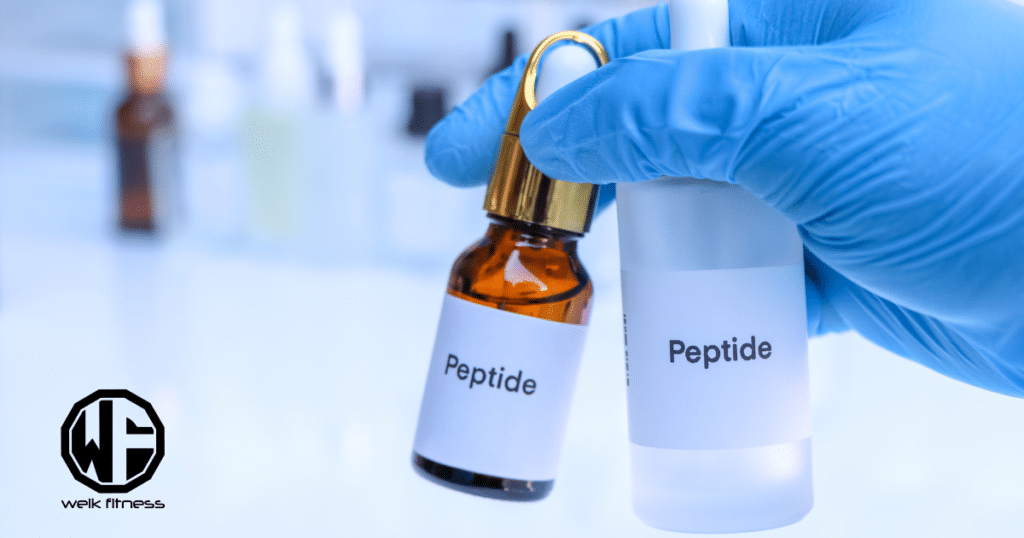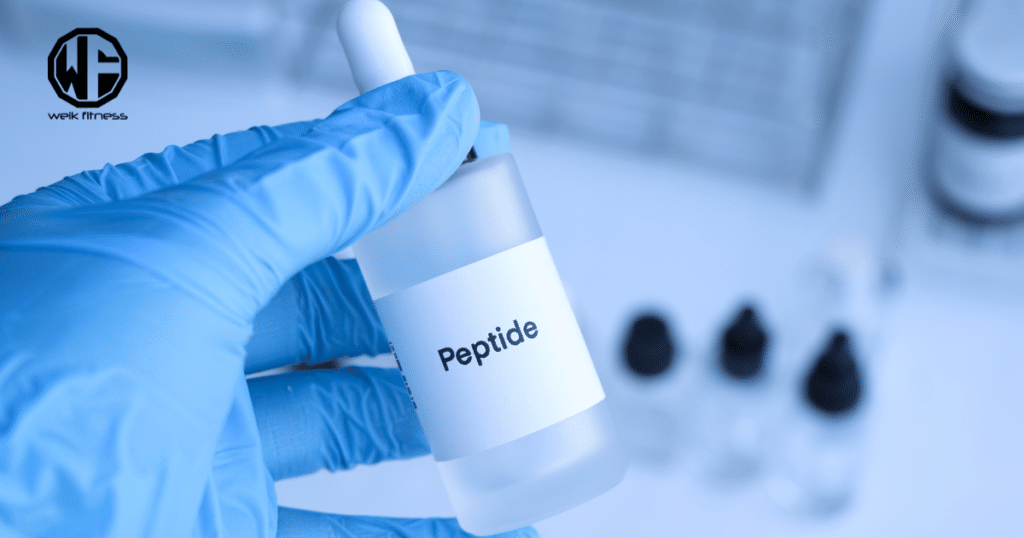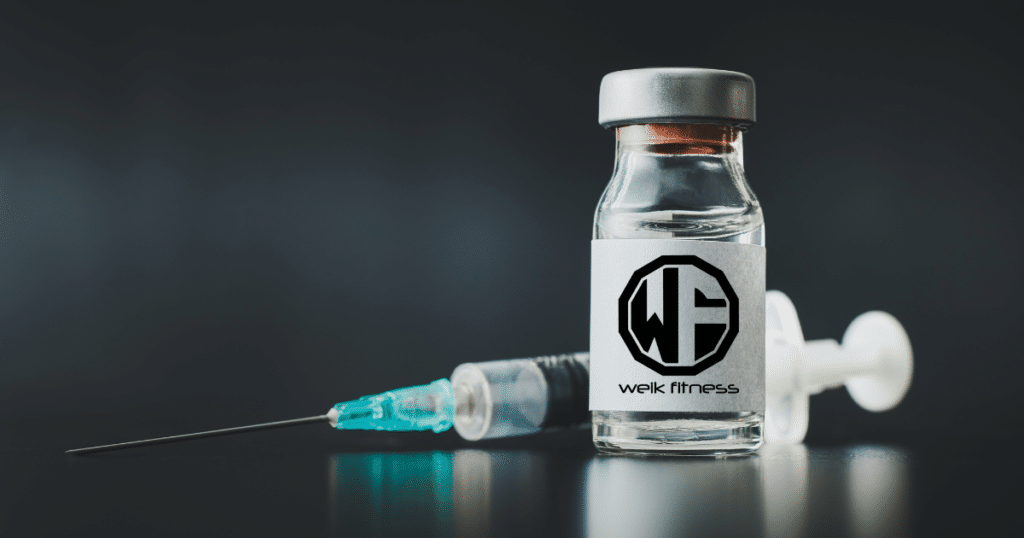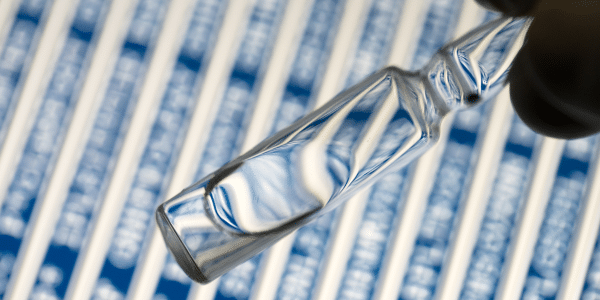Are Peptides for Bodybuilding Even Worth Using?
When it comes to the topic of bodybuilding and longevity, there’s a buzz lately about the use of peptides for bodybuilding — a fitness trend taking the spotlight of much controversy.
For anyone familiar with the grind of the gym, building muscle is no walk in the park. Simply showing up or even moving some weight around isn’t going to add massive size. It demands unwavering dedication to a rigorous workout routine and a carefully crafted nutrition plan.
Given the challenges, it’s no wonder that scientists are turning their focus toward peptides and what they can do to enhance the human body. These tiny compounds are becoming subjects of interest, potential allies in the pursuit of hypertrophy and the intricate processes that lead to muscle growth. It’s interesting to see researchers explore the possibilities of peptides for bodybuilding and muscle development and what their research shows.
In this article, we will uncover and dive deeper into the benefits of peptides for bodybuilding and whether they are ideal or not for the sport of bodybuilding.
Disclaimer: This article is for informational purposes only and is not meant to treat or diagnose any condition. It is recommended that you speak with your doctor or dietician if you plan on making any changes to your supplement regimen.
Table of contents

What are Peptides?
Peptides, including Growth Hormone Secretagogues (GHSs), are essentially short chains of amino acids, those tiny building blocks crucial for forming peptides and proteins.
While your body naturally contains peptides, you can also find them in protein sources like meat, fish, dairy, eggs, beans, lentils, and whole grains. Manufacturers can either extract these peptides from natural sources or create them by combining individual amino acids.
The structure of peptides closely resembles certain hormones or messaging compounds already present in your body, and many have the ability to penetrate tissues. These amino acid chains play a vital role in various processes within your body, contributing to hormone production, DNA synthesis, and, importantly, the construction of muscle tissue. This muscle-building aspect is what captures the attention of bodybuilders and fitness enthusiasts.
How Do Peptides for Bodybuilding Work?

With their focus on swift and efficient changes in body composition, bodybuilders are increasingly drawn to certain peptides. A notable group to be mentioned here is Growth Hormone Secretagogues (GHS), capturing the attention of bodybuilders due to their capacity to trigger the production and release of human growth hormone (HGH).
Related Article: Are Edgy Product Names Good Marketing or a Bad Idea?
HGH, a hormone secreted by the pituitary gland, plays a pivotal role in enhancing muscle growth and facilitating the loss of body fat. This is achieved partly through its stimulation of the liver to give out insulin-like growth factor-1 (IGF-1), which, in turn, triggers muscle protein synthesis and growth, along with promoting the breakdown of body fat.
While HGH gained popularity in the 1980s among athletes, including bodybuilders, safety concerns led to its off-label use ban in 1989. Growth Hormone Secretagogues are now seen as potential alternatives, believed to offer similar benefits with fewer side effects, contributing to their rising popularity among bodybuilders.
As of now, research indicates that Growth Hormone Secretagogues (GHS) contribute to an increased release of Human Growth Hormone (HGH) or Insulin-like Growth Factor-1 (IGF-1) in humans.
Are Peptides for Bodybuilding Better Than Steroids?

The comparison between peptides for bodybuilding and steroids for bodybuilding depends on various factors, and it’s essential to understand the differences between the two.
- Mechanism of Action:
- Steroids: Steroids are synthetic versions of hormones, such as testosterone, that promote muscle growth by increasing protein synthesis and nitrogen retention. They can have powerful and rapid effects on muscle mass and strength.
- Peptides: Peptides are short chains of amino acids that can influence various physiological processes in the body. Some peptides stimulate the release of growth hormone, insulin-like growth factor 1 (IGF-1), and other anabolic hormones, promoting muscle growth over time.
- Side Effects:
- Steroids: Steroids can have significant side effects, including liver damage, cardiovascular issues, hormonal imbalances, and psychological effects. Prolonged use or abuse of steroids can lead to serious health problems.
- Peptides: Peptides are generally considered safer than steroids, as they often work with the body’s natural processes. However, like any substance, peptides may have side effects, and their safety depends on the specific peptide used.
- Results and Gains:
- Steroids: Steroids are known for providing rapid and significant muscle gains. However, these gains may come with the risk of water retention and a higher likelihood of losing some of the gains when discontinuing steroid use.
- Peptides: Peptides may offer more gradual and sustainable results. They are often used for long-term muscle development and overall health improvement rather than rapid, short-term gains.
- Legal Considerations:
- Steroids: Anabolic steroids are often controlled substances, and their use without a prescription is illegal in many places. Their possession and use for performance enhancement can lead to legal consequences.
- Peptides: Some peptides may be available for medical use or research purposes and may be legal under certain circumstances. However, the legality of specific peptides can vary, and it’s essential to be aware of local regulations.
- Health Risks:
- Both steroids and peptides may pose health risks, and their use should be approached with caution. It’s crucial to consult with a healthcare professional before considering any performance-enhancing substances.
In summary, neither peptides for bodybuilding nor steroids can be universally labeled as “better” for bodybuilding, as their effectiveness and safety depend on individual goals, health conditions, and legal considerations.
Are There Side Effects to Using Peptides?
Yes, like any substance, peptides for bodybuilding can have side effects. The nature and severity of these side effects can vary depending on the specific peptide, dosage, and individual response. It’s important to note that peptides are often used for various purposes, including medical treatments, and not all peptides are used for performance enhancement or bodybuilding.
Here are some general considerations regarding the potential side effects of using peptides:
- Allergic Reactions:
- Some individuals may be allergic to certain peptides, leading to allergic reactions such as itching, redness, or swelling at the injection site. In severe cases, anaphylaxis can occur, which is a potentially life-threatening allergic reaction.
- Digestive Issues:
- Peptides administered orally may cause digestive issues such as nausea, vomiting, or diarrhea.
- Injection Site Reactions:
- For peptides that are administered via injections, there may be local reactions at the injection site, including pain, swelling, or redness.
- Changes in Blood Sugar Levels:
- Peptides that affect insulin levels or glucose metabolism may lead to changes in blood sugar levels. Individuals with diabetes or insulin resistance should be cautious and consult with a healthcare professional.
- Hormonal Changes:
- Peptides that influence hormone release, such as growth hormone-releasing peptides, may cause hormonal fluctuations. This can have both positive and negative effects depending on the individual’s goals and health status.
- Water Retention:
- Some peptides may cause water retention, leading to temporary weight gain and bloating.
- Long-Term Effects:
- The long-term effects of peptide use are not fully understood, and the safety of prolonged use may vary depending on the specific peptide. Regular monitoring and medical supervision are crucial for assessing long-term effects.
- Interactions with Medications:
- Peptides may interact with medications or other substances, potentially affecting their efficacy or increasing the risk of side effects. It’s important to inform healthcare providers about all substances being used.
It’s essential to approach the use of peptides for bodybuilding with caution, obtain them from reputable sources, and, most importantly, consult with a qualified healthcare professional before starting any peptide regimen. Professional guidance can help assess individual health risks, determine appropriate dosages, and monitor for potential side effects. Additionally, individuals should be aware of the legal status of the specific peptides they intend to use.
Benefits of Peptides for Bodybuilding
Here are some of the most notable benefits of peptides for bodybuilders:
1. Muscle growth
The integration of peptides into bodybuilding routines presents a multitude of benefits for athletes and fitness enthusiasts. Additionally, peptides play a pivotal role in amplifying muscle growth. By triggering the production of growth hormone and insulin-like growth factors, peptides establish an optimal environment for muscle hypertrophy. This translates to accelerated gains in muscle mass and strength, surpassing the outcomes of traditional training alone.
2. Muscle recovery
Beyond muscle growth, peptides contribute significantly to muscle recovery. Intense workouts often result in muscle damage and inflammation. Peptides, such as BPC-157 and TB-500, have demonstrated notable efficacy in promoting tissue repair and reducing inflammation. This acceleration in the healing process allows for a quicker rebound from strenuous training sessions, enabling more frequent and consistent training.

3. Fat loss
Peptides also emerge as potent allies in optimizing fat loss. Varieties like CJC-1295 and Ipamorelin elevate the production and release of growth hormone, subsequently boosting metabolism and facilitating fat burning. Incorporating peptides into your training and nutrition plan can pave the way for a leaner and more defined physique.
4. Athletic performance
Furthermore, peptides contribute to overall athletic enhancement. They elevate endurance, boost energy levels, and expedite recovery time between workouts. Whether you’re a bodybuilder, powerlifter, or endurance athlete, peptides offer a competitive edge, propelling you to surpass your limits and achieve new heights in your athletic pursuits.
Click here to continue reading…


*Disclosure: This article may contain affiliate links or ads, which means we earn a small commission at no extra cost to you if you make a purchase through these links. These commissions help support the operation and maintenance of our website, allowing us to continue producing free valuable content. Your support is genuinely appreciated, whether you choose to use our links or not. Thank you for being a part of our community and enjoying our content.
PLEASE CONSIDER SHARING THIS ON YOUR SOCIAL MEDIA TO HELP OTHERS LEARN MORE ABOUT THIS TOPIC.





